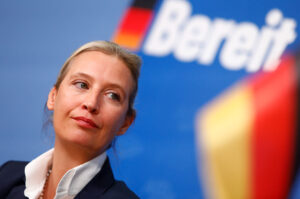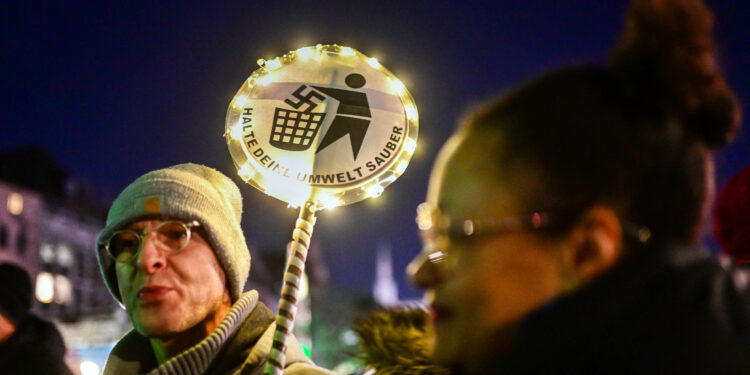Brussels – One and a half million people took to the streets of Germany’s major cities to support one of the potentially most disruptive demands in national politics (with heavy repercussions on the European scene) since the birth of the Federal Republic: the banning of the far-right Alternative für Deutschland (AfD) party. The huge street demonstrations over the weekend—particularly in the capital Berlin—highlighted how the debate on the advance of the far-right in the country is an increasingly urgent and heated issue, not least in view of the election polls and the European elections in June.

Concerns
are raised not only
about AfD’s performance on the ballot, but more importantly about the democratic resilience of a country facing major economic difficulties and farmers’ protests against the government. At the heart of the debate in Germany is the banning of the main right-wing nationalist party based on Article 21 of the Constitution, which defines “unconstitutional parties which, by their objectives or by the behaviour of their adherents, seek to weaken or abolish the free democratic fundamental order or endanger the existence of the Federal Republic of Germany.” The issue became especially urgent after the publication of a report of Correctiv, which revealed the purpose of a meeting in December between AfD leaders, party backers, and some neo-Nazi figures: to discuss a plan for “remigration,” or large-scale expulsions of migrants with residence permits and asylum seekers, and foreign-born German citizens.
AfD is classified as a “suspected right-wing extremist organization” by the Federal Office for the Protection of the Constitution (BfV), the civilian intelligence service. However, it does not seem so simple to follow the path of banning it, because of the legal complexity and its possible ineffectiveness in a country that currently sees the extreme party projected to take second place at the polls. The co-leader of Alternative für Deutschland, Alice Weidel, denied in an interview for Financial Times that “remigration” is part of her party’s program, although she did not rule out the plan tout court, pointing out that it would involve expelling people who have “illegally acquired citizenship under false pretenses” or “with dual nationality suspected of terrorism or convicted of criminal acts.” Similarly, Weidel made it clear that refugees who arrived in Germany after the Russian invasion of Ukraine would have to “all go home” once the war was over and attacked the decision to grant them social security benefits.

The co-leader of Alternative für Deutschland, Alice Weidel (credits: Michele Tantussi/Afp)
Another source of concern about AfD plans also closely involves Brussels. In the same interview, the co-leader of the far-right party called Brexit “a model” for Germany, an “absolutely right” choice that would show that “such a sovereign decision can be taken.” Germany’s far-right nationalist party has never disavowed the so-called “Dexit” (from Deutschland plus exit) and, now that it is aiming for government, it is again presenting the option of leaving the European Union as an issue for the people. First and foremost, AfD would try to limit the powers of the EU Commission—”an unelected executive”—but “if we fail to rebuild the sovereignty of the EU member states, we should let the people decide just as the UK did,” with a “referendum on Dexit,” are Weidel’s words.
With the goal of coming to power “in 2029” (date of federal elections after next year’s round), on the alliance plan AfD aims for a government with the Christian Democratic Union: “The CDU will not be able to maintain the bloc,” is Weidel’s prediction, referring already to the present situation of the Länder of former East Germany where “we can form a clear right-wing majority; they cannot refuse to accept it in the long term.” In this sense, the words of the president of the CDU, Friedrich Merz, about the debate on the far-right in the country seem rather disturbing. Speaking with Die Zeit, Merz ruled out any cooperation at the federal level with AfD (while “it is more difficult” at the local level), but also warned that “rhetoric about Nazis gets us nowhere,” because “not all” voters of this party draw on national socialist rhetoric. Very tough, on the other hand, the chairman of the European People’s Party (EPP), Manfred Weber, on X: “Society needs to stand up against inhuman and racist thinking that undermines the state and democracy,” because “the AfD would mean the sell-out of Germany, its decline and a different country.”
Germany’s political fragmentation
One must look to the right to analyze the political and social tension in Germany which is dealing with the consequences of rising energy prices and economic recession. After decades of stability led by the traditional parties—Christian Democrats and Social Democrats—since the establishment of the unprecedented “traffic light coalition,” the political scene is increasingly fragmented and extremist forces appear to be the most capable of
capitalizing on the German crisis. The collapse of the three governing parties is striking if one compares the results of the September 26, 2021, national elections with the election polls of two and a half years later: The Social Democrats have collapsed to 13 per cent (-13 points) the Liberals to 5 (-7) and the Greens to 13 (-2), which would bring the coalition as a whole to a -22 per cent of voter preferences. Benefiting is only the popular centre-right of the Christian Democratic Union—at 30 per cent according to polls (+6 points)—but especially the far-right nationalists of Alternative für Deutschland, now given as the second-largest party at 22 per cent (+12).

Although these are polls that will then have to be tested at the ballot box, this trend has now been going on for months in Germany and already in the fall of last year showed that in some Länder voters are turning increasingly to the right: at the October 9 elections in the federal states of Hesse and Bavaria, the AfD recorded its first political leap forward, while the Social Democrats, Liberals, and Greens all suffered major defeats. Three eastern Länder—Brandenburg, Thuringia, and Saxony—will go to the polls this year and the far-right party is leading on all three fronts. But the main focus should be on the European Parliament elections in June, when not only the AfD will test its electoral strength, but also new emerging parties seeking to fish in the same vote pool.
The latest is WerteUnion (Union of Values), founded last Saturday by a group of former members of the CDU after cutting ties with the Christian Democrats. The new party—which has the same name as the unofficial sub-organization of the CDU that was founded in 2017 in opposition to the policies of former chancellor Angela Merkel—will support a right-wing “conservative policy” and contribute to a “political turnaround” in Germany, said its leader and former head of Germany’s national intelligence agency, Hans-Georg Maaßen, who no longer hides his closeness to the AfD. Plans for the creation of the new party had been emerging for weeks, and before the spontaneous exit, CDU leader Merz had announced that he would present a motion of incompatibility of the WerteUnion at the next party congress.

BSW leader Sahra Wagenknecht (credits: John Macdougall/Afp)
Also included in German political fragmentation is the force launched by one of the best-known faces of the far left, Sahra Wagenknecht, former leader of Die Linke. She promises to save democracy in the EU’s largest economy from the threat posed by the advance of far-right parties, seeking to intercept the very voters who are abandoning traditional centrist parties. The new party— Sahra Wagenknecht Alliance (BSW) named after its founder and which polls put at around 7 per cent—aims to reverse Germany’s course on unpopular initiatives by the Scholz government, such as environmental ones, but also on arms supplies to Ukraine, reducing the number of migrants and improving services provided by the state. A program not too different from that of the parties from which she wants to take voters, despite being on the opposite spectrum of the political arena.
English version by the Translation Service of Withub





